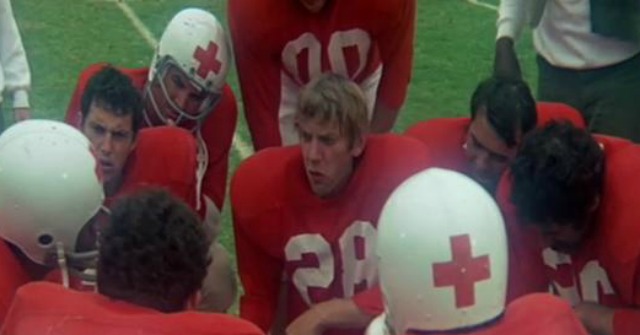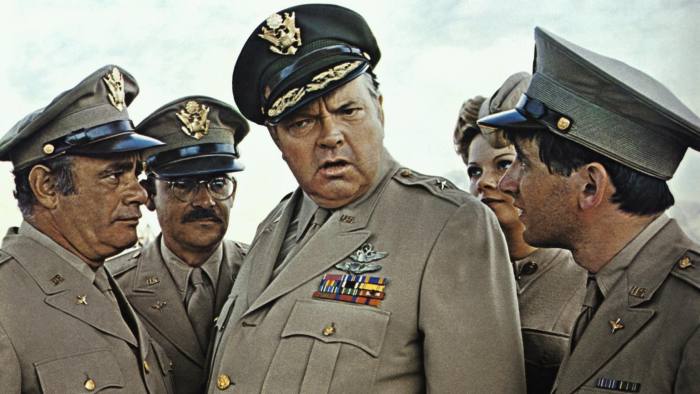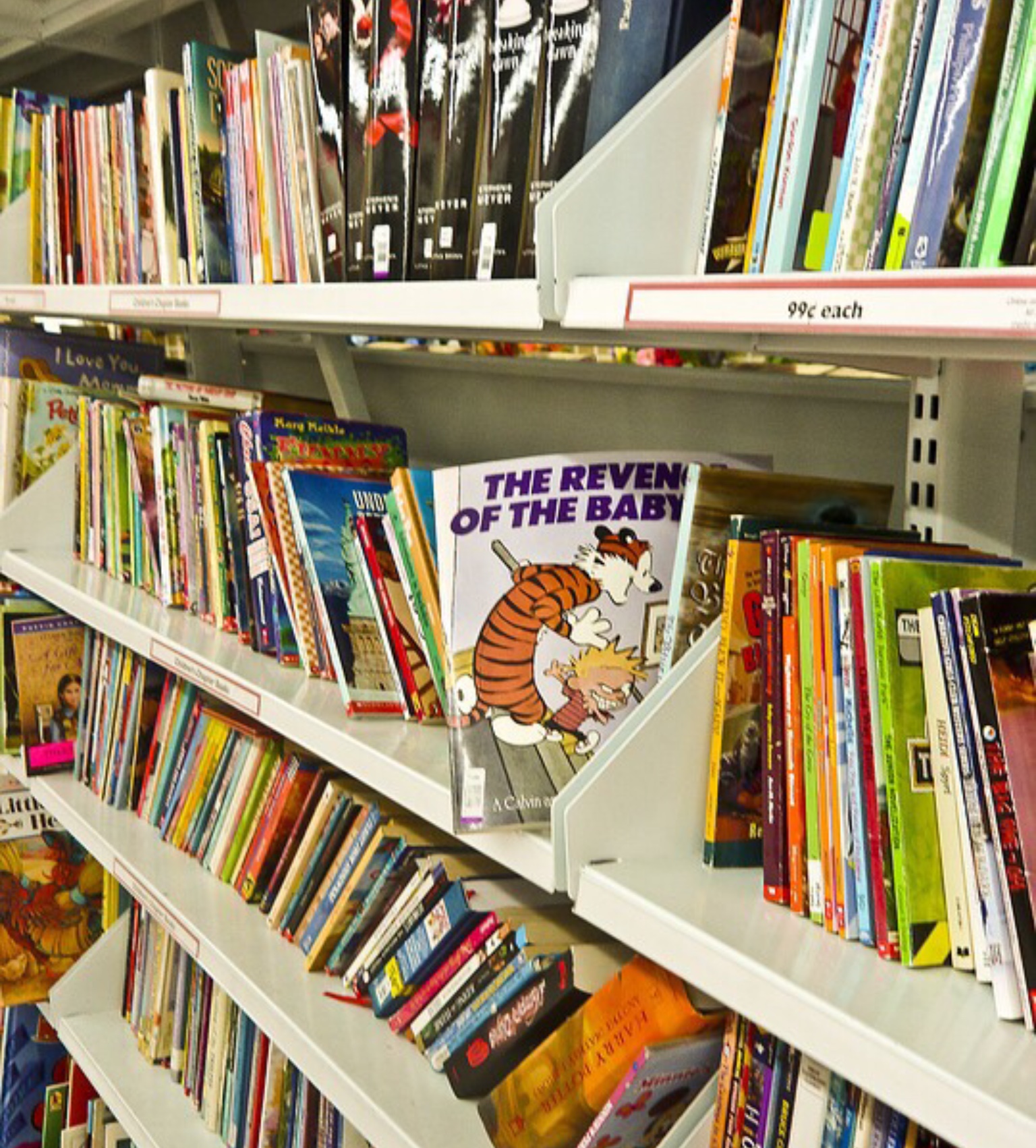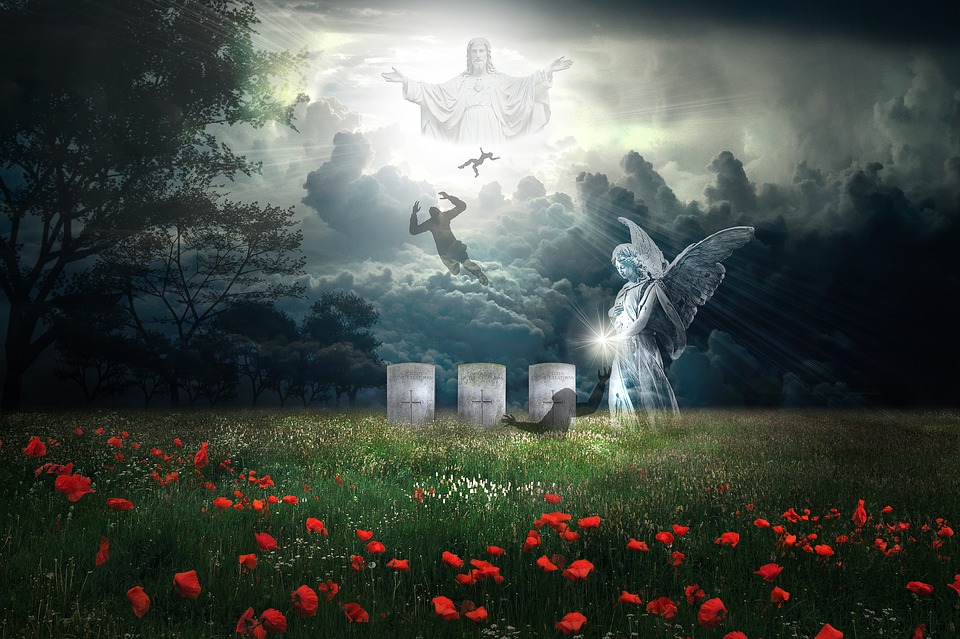And so I come to the end of my retrospective year by year look at seventies cinema (my favourite decade for movies), which bizzarelly is actually where it all began. Look, I admit I blundered by picking up from where my first year by year series started (1975) and working my way backwards from 1974, but it didn’t make any less sense than Tenent lets face it.
So in any case, next time I will start to cover 60’s movies and starting uncontroversially with 1960. So for now let wrap up 1970, and look out what films the Beatles had time to see now they’d split up, what the crew of Apollo 13 could watch after not landing on the moon, and what Nixon probably didn’t watch because he was too busy ordering carpet bombing of civilians in Vietnam.
Speaking of which as my three choices for 1970 show, the ongoing Vietnam War was prompting an anti war backlash from filmmakers, as movies turned ever further towards anti establishment.
M*A*S*H (director: Robert Altman)

Three army doctors cope with the insanity of dealing with casualties during the Korean War.
Along with Star Trek there is probably no other television show that can be found constantly playing on some channel, day after day. In it’s day it was a phenomenon and was responsible for some of the most memorable viewing experiences. Audiences had to deal with the cruel hammer to the gut of Henry Blake’s plane being shot down on his way home, trying hard to accept BJ Honeycut even though Trapper John was way funnier, rolling your eyes when an episode had the god awful fake laugh track and bawling your eyes out in the final episode where they all said their goodbyes. Yet the original film, that kicked off careers for Donald Sutherland and Elliot Gould is less well known and while still a comedy is a very different beast.
It may be set in the Korean War of the 50’s, but MASH is very much about the Vietnam War that was still brutally in progress in 1970 (make that connection in a film essay and you get an easy tick for that). Up to this point the only movie about the Vietnam War had been the embarrassingly tub thumping patriotism of John Wayne’s The Green Berets, a love letter to the American military. It’s a great example of subversive film making that while an overt anti Vietnam War may have been a no no while the war was in progress, the hostility to the War and military could be sneaked in disguised as a Korean War movie.
MASH follows the exploits of three Army surgeons Hawkeye (Donald Sutherland), Trapper (Elliot Gould) and Duke (Tom Skerritt, incidentally the character that wouldn’t make it into the more famous TV series), who are brilliant in the operating theatre but rowdy and insubordinate in their own time. With attitudes that would be appealing to counter culture seeking audiences, the three have total disregard for the military establishment and their superiors. Hawkeye and Duke’s first act on arriving in Korea is to steal an army Jeep, and on arriving in camp they quickly set about manipulating the man in charge Lt Colonel Henry Blake.
For those familiar with the Alan Alda hijinks of the TV show, the aggressiveness of the surgeons in the film may well be a shock to the system. While the three share the banter of the TV show, there is a darker cruelty to some of the gags. Like in the TV show, the humour is often at the expense of Majors Frank Burns and “Hotlips” Houlihan. However there is a Savagery and deeper humiliation such as when the two are having sex and “Radar,” (the only actor to carry his character into the show) sneaks a microphone into their tent and broadcasts their lovemaking over loudspeakers so the entire camp can hear.
The humiliation and Hawkeye’s subsequent mocking ends with Burns being carted off to an asylum. Meanwhile the pranks at Hotlips expense continue and reach an unpleasantness, when the curtains of her shower is dropped exposing her nakedness to the rest of the camp. Tasteful or not (MASH has been cited as paving the way for the comedies of Porkies and Animal House), the gags are funny, mainly thanks to the easy banter and dry humour of the three leads.
While 21st Century sensibilities has lead to retrospectives criticising the film with allegations of misogyny and bullying, it can also be argued that the Majors are targets because they represent the military establishment that the camp are at odds with. Burns and Hotlips are stiff, cold hearted and lovers of the military. In a sense they represent the old Conservative establishment, while the rest of the camp with their drinking, partying and sex drives resemble the 60’s liberation. Burns himself is especially nasty and proves deserving of some of the mocking that comes his way when he blames the death of a patient on a young orderly which prompts Trapper to punch him after his shift.

MASH follows an episodic style narrative, with short story scenarios cropping up and reaching a conclusion before moving neatly onto the next one. In some of these the surgeons show a softer side, such as their efforts to help stop a young Vietnamese lad being drafted into the Korean army and disobeying orders to perform surgery on a local infant (for which they have to frame and blackmail a General with photos of him in a brothel to escape disciplinary action). In another the camp has to work together to prevent the suicide of one of the camp dentist who after a failed sexual liaison believes he may be gay (a storyline that in a film today would be considered uncomfortable, though it should be seen in the context of the era it’s set in). The concluding story features an epic and violent football game against a rival hospital unit, which both teams wager heavily on and try to cheat in various ways such as recruiting ringers. The game incidentally also features the first (though some dispute) use of the word “Fuck,” in a film with the hilarious line “Ok, bub your fucking head is coming right off!”
MASH is a massive two fingers towards the establishment and in specific the military leadership. It subversively portrays those in authority as idiots and incompetent, while at the same time showing the effects the ongoing war in Vietnam was having on it’s soldiers with the explicit and bloody scenes of wounded victims in the operating theatre and focusing it’s story on the people who are lumbered with mopping up the violence.
It’s also incredibly damned funny.

Catch-22 (director: Mike Nichols)

A Bombardier during the Second World War starts to believe he may be the only sane man on his surreal airforce base.
A film that went even further than MASH in mocking the high command of the military was Catch-22, based on a novel that was considered unfilmable. However unlike MASH, Catch-22 baffled both critics and audiences at the time, although it’s since being regarded as a cult classic by people like, well, me.
Catch-22 is absolute insanity, with some of the most absurd humour just this side of an Airplane movie. Some of the situations are farcical, the characters over the top in their preposterousness and there is a constant surrealism that pings the film back and forth between reality and fantasy, even at times making you wonder if what you are watching is the dream of it’s main character Yossarian. It’s crazy and I love it.
The tone of Catch-22 can be best summed up by the explanation of what the Catch-22 in this scenario actually is. Here Captain Yossarian wants to be grounded from duty, terrified because he believes, quite rightly that the enemy is trying to kill him (“if they’re not trying to kill me why are they shooting at me,” “They’re shooting at everyone Yossarian”). The doctor tells him the only way to be grounded is if he’s crazy as he’d be unfit to fly, and flying dangerous missions is crazy and all he has to do is ask not to fly on missions, however not wanting to fly missions is actually a sane response and so he’s then proved he’s not crazy and therefore is sane and fit to fly.
“It’s some catch that catch-22,” “It’s the best there is!”
The absurd logic of this Catch-22 drives many of the scenarios in the film. Major Major in order to avoid having to do work sets up a rule that people are not allowed to come see him when he is in his office, but are allowed to come see him when he is not there. One of the friendly, optimistic pre mission pep talks from Major Danby informs the bombing crews that because it’s a clear day the targets will be visible, but in turn they will be visible to enemy guns.
On one bombing run, Yossarian drops his bombs early into the ocean to avoid attacking an innocent village. To avoid a scandal and admit the failure of the mission the base leaders arrange for medals and a full ceremony for the crew.
However the most absurd storyline follows the exploits of Lieutenant Milo who sets up a business syndicate investing in the black market (his first deal is to trade the silk from the crew’s parachutes). After some bad deals, Milo is left with a surplus of cotton, and he ends up striking a deal with the Germans to buy the cotton in return for bombing their own base.

There are smaller, surreal gags, sometimes with dark undertones. Two gossiping nurses, change what appears to be a catheter on a completely bandaged patient and seem to have plugged the full urine bottle right back into the poor guy. It took me many viewings before I noticed that a portrait in Major Major’s office changes from President Roosevelt to Winston Churchill and then to Stalin all in the same scene.
Selling all this madness is some great but at times way out casting. Alan Arkin perfectly encapsulates the madness of being the only person to respond to all the craziness in the appropriate way. Martin Balsam as the camp Colonel leads the ridiculousness and unsympathetic nature of military command. Anthony Perkins is the well meaning but bumbling ineffectual camp Chaplin. John Voight is the comically ambitious Milo. Art Garfunkel and Bob Newhart are interesting casting choices, while Charles Grodin is chilling as a seemingly charming and mellow Captain who out of the blue murders a young girl he’s raped.
Almost stealing the film just by appearing in two scenes is Orsen Welles as an exasperated General seemingly losing his will and marbles. Welles sits in on a mission briefing and can’t understand why he’s not allowed to shoot Danby for groaning, and later grumpily disperses the medals to Yossarian’s crews. Welles is suitably over the top brilliantly owning the screen with blank, incredulous expressions and delivering lines a tired, resignation to the insanity of what’s going on.
Catch-22 is bizarre and hilarious in equal measure. Some of the scenes may leave you shaking your head at what you’ve just seen (Yossarian pretending to be a grieving families son, and Doc seeming to have become a ghost when a plane crashes that he was never even on for example), and the ongoing Yossarian dream sequences and flashbacks don’t seem to pay off.
It may be too out there for some tastes, but for the right sense of humour Catch-22 is subversively funny and a gorgeous shot film.

Little Big Man (director: Arthur Penn)

A 121 year old man recounts a life of misadventures on the American frontier, living among the White settlers and the Native Americans.
If 1970 American cinema had little respect for it’s military, it also was ready to challenge the romanticism of it’s origins as a nation. In Little Big Man, we see a revisionism of the classical Western values, ready to portray the American Cavalry as violent oppressors and the Natives portrayed sympathetically while being slaughtered and driven from their own land.
Little Big Man is Jack Crabb played with suitable vulnerability by Dustin Hoffman (coming off his success in The Graduate and Midnight Cowboy), who as a child survived the massacre of his pioneer community, being saved and raised by the Cheyenee as one of their own. Years later when the Cheyenee clash with the US Calvary, Crabb uses being white to save himself and starts life again in American settler society. Crabb flits back and forth between the two worlds throughout his life, trying various careers and roles with little success, but always managing to survive.
There are parallels with what was going on in Vietnam at the time, with the US Cavalry portrayed as how the American military was being perceived, a vastly superior fighting force attacking a smaller indigenous people. The film places Crabb at the events of two real life massacres of Native innocents which resemble the Mai Lai slaughter of villagers by US troops just a few years previous.
![Little Big Man [Blu-Ray] Arthur Penn](https://exclaim.ca/images/Little-Big-Man-[Blu-Ray]-(Directed-by-Arthur-Penn)-.jpg)
Crabb is an very different protagonist to what we are used to in a western, He is an everyman, a lucky survivor rather than a hero, and a failure as a pioneer, his attempts at starting livelihoods and families always ending in disaster. He finds himself ripped off, tarred and feathered, or running for his life many times, while his various wives either kidnapped by Natives or slaughtered by Calvary. He’s a loser when it comes to the opportunity of what would be called the American dream, in many ways you can consider him a reversal of Forrest Gump.
Uncannily, like the Forrest Gump to come several decades later, Crabb finds himself unwittingly involved in key moments in history and interacting with historical figures. His brief attempt to live as a gunfighter (The Soda Pop Kid), bring him into contact with Wild Bill Hickock and seeing how paranoid the live has made him drives him to quit. Years later he runs into him again in Deadwood and is there when he is gunned down.
More notably, Crabb finds himself working for General Custer who in a deconstruction of a western hero (and another swipe at the US Military leaders) is presented as a deluded, vain buffoon. Crabb as Custer’s guide is shown as being responsible for leading Custer into his famous last stand at the battle of Little Big Horn. Ironically because Custer doesn’t trust him and believes everything he says will be false information, Crabb tricks Custer by actually telling him the truth about the strength of Cheyenne forces and thus ensures he walks into a trap.
Little Big Man is an entertaining, often funny story, with Hoffman bringing humour as a panicky, out of his depth man, just trying to get by in a world at odds with itself. In the background is a clash of two civilizations over the land, neither of which will come through the conflict unscathed. The Natives obviously lose their way of live, but the members of the white settlers that Crabb meets don’t thrive in this new world they have created. A surgeon Crabb works with loses his limbs, a puritan wife who attempts to seduce him see’s pursuit of sex lead her to be a prostitute. The trappings of “civilisation” prove it to be anything but for those who live in it.
In a rarity in westerns up to that point, the plight of Native Americans is treated sympathetically at the atrocities they are forced to endure at the hands of the colonisers. Yet they are not just treated as victims, but fully fledged people with their own quirks in their culture. One of the warriors (who resents Crabb for saving his life) adopts a discipline where he has to do everything in life backwards. There is also a lot of humour to be found at the end, where Crabb’s father figure and Chief of the tribe sets out to have a dignified death, in full ceremonial attire. After laying down peacefully to die it begins to rain and the Chief releasing he’s not going to die that day, in an “oh well,” moment gets back up and goes with Crabb to go something to eat.
Little Big Man is epic and thought provoking, and bringing a fresh perspective to a genre that being so intrinsically linked to American mythology was ready to be revaluated.

WTF??? Love Story
“Love means never having to say your sorry,” was the romantic tagline that helped to make this the date movie of 1970. A tale of a couple from different backgrounds, him a brash rich kid, her a working class intellectual, falling in the truest of loves. Only for her to die and him to end up sat on a bench in the Snow on his own.
Because yes, in 1970, even romance had to be deconstructed and leave you totally depressed as you left the theatre.
Don’t get me wrong, with it’s stirring, heartbreaking score and the incredible chemistry of Ali Mcgraw and Ryan O’neal, is the template of the classic tear jerker. Whether it works for you, depends how open you are to sentimentality (hands in the air I am, and I can’t tell you how many times I’ve walked out of a cinema with red eyes), but even non cynics will ultimately find this depressing.
Believe it or not there is a sequel, Oliver’s Story, which is even more of a downer as we get to experience Jenny’s funeral and Oliver finding a new love but the relationship failing because he can’t get over his dead wife.
Suffice to say a double bill viewing of these two films during this troubled time is not recommended.

Join me next time when I’ll be begin exploring the decade of drugs, free love, flower power and murderous hippies.
Please stay safe
Dazza








F*ckin’ awesome things here.